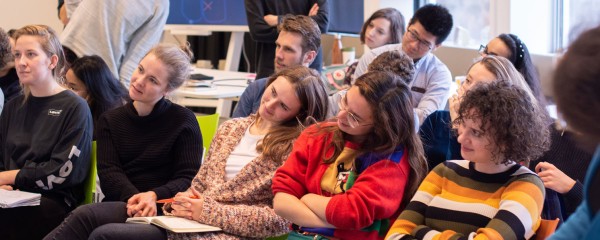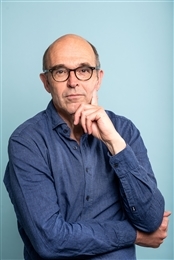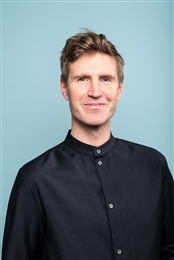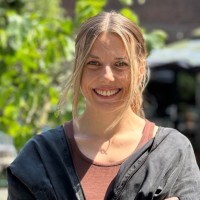
Policymaking for a radical time
The relationship between government and society is under pressure. Political impotence is influencing policymaking. Issues surrounding allowances, the handling of earthquake damage, questions surrounding Tata Steel, and the inability to find an administrative way out of the nitrogen maze set the tone. Meanwhile, problems are piling up in the physical domain: where will we build, how will we keep our feet dry, how will we organize our sustainable energy? Problems that demand vision and spatial planning choices. These are long-term issues, requiring the government to consider the public interest while also considering the diverse perspectives of citizens. The lack of compelling images of the future is more evident than ever. But how do you arrive at new, shared visions of the future in this era when disagreement seems to prevail?
What is the course about?
At the heart of this year’s Mixed Classroom course is the idea of ”captured futures,” the notion that in the 21st century we are stuck in the aspirations and images of the 20th century. How did we arrive at our images “back then”? How can we, from professionals to citizens, now arrive at new, compelling visions of the future? Which policies are resilient in these radical times? Can public support be linked to future-proofing? And how should professionals and citizens deal with value-laden and controversial themes such as “justice” and “sustainability”?
In the Mixed Classroom ‘25-‘26, we will explore how government and society can recalibrate their relationship. We will focus on “futuring.” This approach centers on the process of shaping shared visions of the future; we will interweave what has increasingly become disconnected: knowledge, policy development, and citizen engagement. We question existing and emerging “techniques of futuring” on how they shape visions of the future. In the course, we teach the basic principles of futuring and also delve deeply into how “building a new imagination” connects with policy work and the realization of new “socio-technological configurations” in society. By mixing (a diverse group of) policymakers and students (from various disciplines), we create a learning environment where we can question each other: how do you arrive at your visions? How do you actually know what you know?
What's in it for me as a professional?
Participants will learn about concepts such as “Captured Futures,” “Techniques of Futuring,” the “Futures Prism,” “soft spaces,” and the “triple re-“ approach (re-imagining, re-coding, re-configuring), and will learn futuristic working methods. Throughout the program, we utilize the Mixed Classroom: policymakers and MSc students collaborate continuously, resulting in interesting mutual learning experiences. The course concludes with a public closing event on January 23, 2026.
Who is this course for?
This course is for policy officers working at the Ministries of Infrastructure and Water Management, the Interior and Kingdom Relations, Agriculture, Nature and Food Quality, and Economic Affairs and Climate Policy (EZK) and involved in transition issues. There are also a few spots available for other policy officers involved in this area.
Activists, artists, and local entrepreneurs involved in the theme of “transitions in a radical era” are also welcome.
Ready to join this course?
At Utrecht University, you’re guaranteed high-quality education at a leading international research university. What makes us unique is that we are the only university in the Netherlands conducting scientific research into how professionals learn. That means our teaching methods are designed specifically to meet your needs as a working professional.
Our top researchers share the latest insights from their fields while participants bring in their own practical expertise. This dynamic exchange creates new perspectives you can immediately apply in your work—while also expanding your professional network.
All our programmes for professionals are built with flexibility in mind. Learn on campus or online, often in the evenings, so you can balance your studies seamlessly with work and personal life.
What is the structure of the course?
This course consists of six mixed classroom sessions and a final event. Together, we’ll explore various forms of futuring, engaging with work from the Urban Futures Studio. Through focused guest lectures and interactive workshops, you’ll be inspired to actively consider the what and how of futuring within your own field and to connect with the other participants.
The program language is English. If you have any questions or concerns about participating, please feel free to contact us to discuss the possibilities.
What is being discussed?
Questions addressed include:
- What makes this era so radical and elusive?
- What “theory of change” often characterizes policy? Are there alternatives?
- How can citizen engagement be improved?
- What role do emotions play in policy? How can we deal with citizen anger and disappointment?
- Can a different “dramaturgy” help find solutions that are supported?
When can I start?
Date | Time | Subject | Location |
|---|---|---|---|
14 November 2025 | 14:00 – 17:00 (drinks afterwards) | Mixed Classroom | Moira, Wolvenstraat 10, Utrecht |
21 November 2025 | 14:00 – 17:00 (drinks afterwards) | Mixed Classroom | Moira, Wolvenstraat 10, Utrecht |
28 November 2025 | 14:00 – 17:00 (drinks afterwards) | Mixed Classroom | Moira, Wolvenstraat 10, Utrecht |
12 December 2025 | 14:00 – 17:00 (drinks afterwards) | Mixed Classroom | Moira, Wolvenstraat 10, Utrecht |
9 January 2026 | 14:00 – 17:00 (drinks afterwards) | Mixed Classroom | Moira, Wolvenstraat 10, Utrecht |
16 January 2026 | 14:00 – 17:00 (drinks afterwards) | Mixed Classroom | Moira, Wolvenstraat 10, Utrecht |
23 January 2026 | 14:00 – 17:00 (drinks afterwards) | Final event | Moira, Wolvenstraat 10, Utrecht |
Course Prices
- The standard price for this course is €1500.
- This course is free for policy officers at the Ministries of Agriculture, Nature and Water Management, the Interior and Kingdom Relations, and Economic Affairs and Climate Policy.
- For activists, artists, and local entrepreneurs involved in the theme of “transitions in a radical era,” the price is €250.
Uiterste inschrijfdatum
De uiterste inschrijfdatum voor deze cursus is: 18 oktober 2025.
Course coordinator
Jeroen Oomen PhD

Jeroen Oomen is assistant professor at the Urban Futures Studio, where he focuses on the social, cultural, and scientific practices that create societies’ conceptions of the future.
Professor
Prof. dr. Maarten Hajer

Maarten A. Hajer is a professor of Urban Futures & Futuring and director of the Urban Futures Studio.
- View profile
Teacher
Dr. Jesse Hoffman

Jesse Hoffman is an assistant professor at the Urban Futures Studio and the Copernicus Institute of Sustainable Development. He studies how societal and political groups can become more resourceful and creative in addressing climate change and related issues such as the global transition to a post-fossil society.
- View profile
Teacher
Christina Klubert, PhD

Christina Klubert is a PhD researcher at the Urban Futures Studio and the Copernicus Institute of Sustainable Development. She investigates the intersection of climate politics, emotions, and citizen participation as part of the EU-wide CIDAPE project: Climate, Inequality and Democratic Action: The Power of Political Emotions.
- View profile
